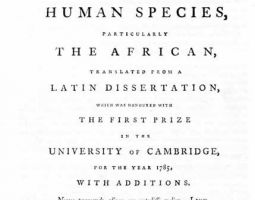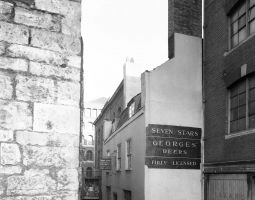In 1787 Thomas Clarkson was introduced, through John Harford, Dr Camplin, Dean Tucker and Matthew Wright and other Quakers, to Thompson, landlord of the Seven Stars. He was, Clarkson says, a very intelligent man who was accustomed to receive sailors when discharged at the end of their voyages, to board them and find them berths on other ships. He avoided all connection with the slave trade, declaring that the credit of his house would be ruined if he was known to send those who put themselves under his care, into it. With Thompson as a guide, Clarkson disguised himself as a miner, with blackened face and wearing working clothes to hide his true identity made nineteen visits to various public houses and inns in the area frequented by masters of slavers to pick up hands. From his own observations and from information given him by Thompson, Clarkson was assured that his suspicions were correct, and that crews were obtained by lies and fraud: ‘I was determined to inquire into the truth of the reports that seamen had an aversion to enter, and that they were inveigled, if not often forced, into this hateful employment. For this purpose I was introduced to a landlord of the name of Thompson who kept a public house called Seven Stars. He was a very intelligent man, well accustomed to receive sailors when discharged at the end of their voyages, and to board them till their vessels went out again, or to find them’
Through Thompson, Clarkson met two ship’s surgeons who had worked on slaving voyages. Alexander Falconbridge had been on four voyages, and James Arnold had been on three and was about to sail on a fourth. Falconbridge wrote of his experiences, and his story was printed in Bonner and Middleton’s Bristol Journal, a newspaper, in 1788. Arnold kept a journal of his voyage on the ship the Ruby, and this was used as evidence by Clarkson against the slave trade.
By 1794, Clarkson had become ill. He retired to the Lake District, where he met and befriended William Wordsworth. The poet wrote the following verse in Clarkson’s honour when the Slavery Bill was passed: ‘Sonnet, To Thomas Clarkson, On the final passing of the Bill for the Abolition of the Slave Trade, March, 1807’
Clarkson! it was an obstinate Hill to climb:
How toilsome, nay how dire it was, by Thee
Is known,—by none, perhaps, so feelingly;
But Thou, who, starting in thy fervent prime,
Didst first lead forth this pilgrimage sublime,
Hast heard the constant Voice its charge repeat,
Which, out of thy young heart's oracular seat,
First roused thee.—O true yoke-fellow of Time
With unabating effort, see, the palm
Is won, and by all Nations shall be worn!
The bloody Writing is for ever torn,
And Thou henceforth wilt have a good Man's calm,
A great Man's happiness; thy zeal shall find
Repose at length, firm Friend of human kind!
William Wordsworth


